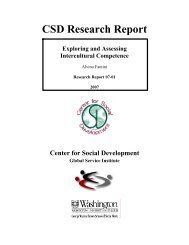Rediscovering social investment in developmental welfare state ...
Rediscovering social investment in developmental welfare state ...
Rediscovering social investment in developmental welfare state ...
Create successful ePaper yourself
Turn your PDF publications into a flip-book with our unique Google optimized e-Paper software.
R E D I S C O V E R I N G S O C I A L I N V E S T M E N T I N D E V E L O P M E N T A L W E L F A R E S T A T E P O L I C I E S :<br />
B A C K T O T H E F U T U R E<br />
demand results <strong>in</strong> beneficial macroeconomic consequences. A weakness of this view is that all types<br />
of redistribution that lead to more spend<strong>in</strong>g are seen as comparable; a related issue is that<br />
redistribution itself is only a means to more spend<strong>in</strong>g. One can also revisit classic philosophical<br />
discussions such as those offered by T. H. Marshal for guidance but these too are left want<strong>in</strong>g <strong>in</strong><br />
terms of specific programmatic guidance (see Johnson, 2010, pp. 28–31; Johnson, 2014a).<br />
An alternative perspective has been called productivist—a term orig<strong>in</strong>ally used by Swedish policy<br />
makers (see Andersson, 2008; Esp<strong>in</strong>g-Andersen, 1992; Kuhnle, 2002) to refer to policies that focus<br />
on material needs, <strong><strong>in</strong>vestment</strong> <strong>in</strong> human capabilities, and that promote participation <strong>in</strong> the economy<br />
(Midgley & Tang, 2001). In contrast to the Keynesian view, productivist policy implicitly views<br />
different types of redistribution as hav<strong>in</strong>g different effects and it views redistribution not merely as a<br />
means to an end of more spend<strong>in</strong>g but as a precondition of growth (note, though, this is not yet<br />
particularly well-formulated). Esp<strong>in</strong>g-Andersen (1994, p. 713) writes: ―the unique contribution of<br />
Swedish <strong>social</strong>ism was its idea of productivist <strong>social</strong> policy. Its lead<strong>in</strong>g theoreticians stood liberalism<br />
on its head, argu<strong>in</strong>g that <strong>social</strong> policy and equality were necessary preconditions for economic<br />
efficiency, which, <strong>in</strong> turn, was a prerequisite for the democratic <strong>social</strong>ist society.‖ 12<br />
The productivist, preventive, <strong><strong>in</strong>vestment</strong>-oriented and <strong>developmental</strong> aspects of <strong>welfare</strong> <strong>state</strong><br />
policies (Atk<strong>in</strong>son, 1995a; Esp<strong>in</strong>g-Andersen, 2000a, b, 2002; Gough, 2001a) rema<strong>in</strong> <strong>in</strong>sufficiently<br />
understood. This is not to say that a preventive approach cannot be contrasted with a curative one;<br />
the latter is based on the ―reparation of damages caused by the realization of <strong>social</strong> and economic<br />
risks‖ (Fouarge, 2003, p. 36). However, as I will discuss below, while the characteristics of such a<br />
preventive approach have been impressionistically associated with the so-called Nordic model<br />
(Korpi, 1980; Ryner, 2007), and while there have been attempts to empirically <strong>in</strong>vestigate whether<br />
and why Nordic countries achieve low poverty, there has been little systematic exposition of the<br />
theory that underlies these empirical <strong>in</strong>vestigations (Milner, 1989, 1994). Specifically, there has been<br />
little development of predictive hypotheses about particular types of policies and their <strong>in</strong>teraction<br />
that would lead to low poverty across countries.<br />
One potential candidate for generat<strong>in</strong>g predictive hypotheses about the particular policies<br />
responsible for these seem<strong>in</strong>gly anomalous outcomes is the Third Way (Giddens, 1998, 2000, 2001).<br />
However, this perspective is deficient. The Third Way <strong>in</strong> part reflects an attempt to promote<br />
particular types of policies, broadly, those that attempt to promote both equality and efficiency, but<br />
was also <strong>in</strong> part devised as an electoral strategy (Ryner, 2010). 13 More specifically, its key policy<br />
12 Productivism is sometimes def<strong>in</strong>ed as promot<strong>in</strong>g economic productivity and growth as the sole purpose of human<br />
organization. For <strong>in</strong>stance, Anthony Giddens (1994, p. 175) arguably mischaracterizes productivism as ―an ethos <strong>in</strong><br />
which ‗work,‘ as paid employment, has been separated out <strong>in</strong> a clear-cut way from other doma<strong>in</strong>s of life.‖ This is not<br />
necessarily the case as <strong>in</strong> Scand<strong>in</strong>avia, where women appear to have been successful <strong>in</strong> comb<strong>in</strong><strong>in</strong>g their dual role as<br />
mothers and workers (Kangas & Palme, 2005). There is a significant difference between say<strong>in</strong>g that economic<br />
productivity and growth is the purpose of human organization and life itself (which is exclusionary of <strong>social</strong> concerns)<br />
and that a great many <strong>social</strong> concerns have economic implications (which is <strong>in</strong>clusionary of <strong>social</strong> concerns). The<br />
question h<strong>in</strong>ges <strong>in</strong> part on how broadly utility is def<strong>in</strong>ed. Refer to Andersson (2005) for discussion of the various uses of<br />
the term productivism. For an excellent and thorough discussion of what has been framed as the difference between<br />
productivism and <strong>developmental</strong>ism, refer to Lee (2007). The relationship of productivism to <strong>developmental</strong>ism is<br />
discussed further <strong>in</strong> Johnson (2010).<br />
13 There is an unresolved debate about whether the Third Way is associated with T. H. Marshall and his emphasis on<br />
rights and responsibilities (Giddens, 1998; Smith, 1998) or whether Marshall is associated with old <strong>social</strong> democracy<br />
(Dwyer, 2004; Kessler-Harris & Vaudagna, 2009). I believe this stems from the ambiguity associated with <strong>social</strong><br />
citizenship rights and its vague implications for the type and level of benefits.<br />
C E N T E R F O R S O C I A L D E V E L O P M E N T<br />
W A S H I N G T O N U N I V E R S I T Y I N S T . L O U I S<br />
11
















